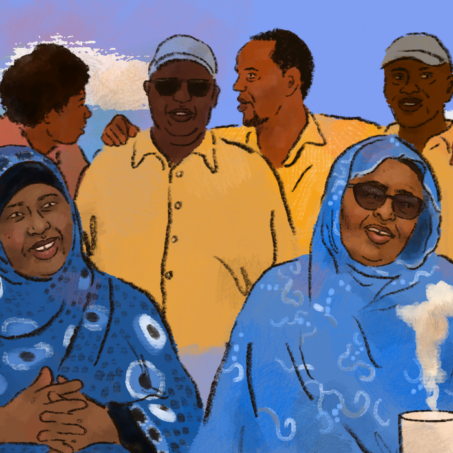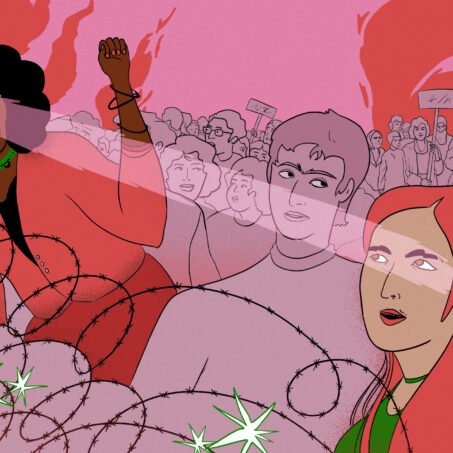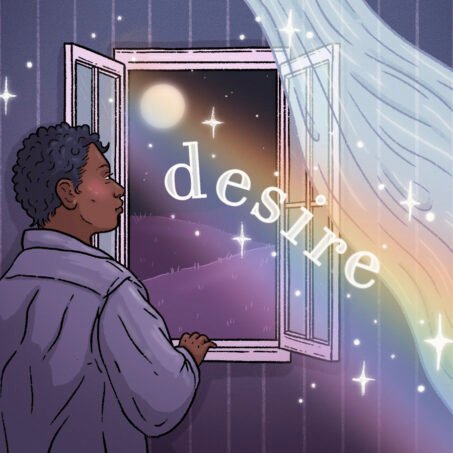As someone who has experienced body dysmorphia, lockdown could have been a make or break moment for my recovery. Being inside for prolonged periods without access to the gym, which had previously become my way of suppressing my obsessive thoughts, would have pushed me over the edge a few years ago. But instead, my addiction to anti-capitalist literature, which reached its peak in the second lockdown, actually taught me more about my experience with body image than any counselling or self-love ever could have.
Body dysmorphia is defined by the NHS as “a mental health condition where a person spends a lot of time worrying about flaws in their appearance. These flaws are often unnoticeable to others.” What is interesting about this definition is just how many of us can relate when it comes to worrying about our appearance. Arguably, the rise of social media and the constant documentation of ourselves through selfies has led to increased pressure to look a certain way and fit the assumed mould of what is deemed as conventional ‘beauty’.

The hyper-accessibility of apps such as facetune and filters which contort faces into avatar-like and euro-centric versions of ourselves have skewed our perceptions of self. Influencer culture too, celebrity culture’s brainchild, has meant that at all times we are bombarded with unrealistic standards of beauty, and a constant source of potential comparison.
What this doesn’t consider however, is that in a system of racial capitalism, we are socialised to question both our own and others’ worth, ranking each other based on falsified constructs that distinguish us by features of our appearance. Eurocentric beauty standards that evolved out of colonialism are inseparable from the modern day context that now pervade the beauty and fashion industry. Fatphobia in particular is one issue that relates heavily to the rise of body dysmorphia.
Fatphobic rhetoric can be seen all over marketing campaigns and mainstream media. Before and after images of celebrities plastered on gossip magazine covers which dissect their weight gains and losses, and praise or punish them respectively, all play a part in conditioning us to fear our bodies changing, and even worse, gaining weight. This nation-wide obsession has been transformed into a business model; fatphobia is immensely profitable, with the global weight-loss industry being worth $586 billion.
Whilst the hegemonic neoliberal economic system teaches us that we are self-seeking individuals with complete agency over our life consequences, too often this leads to a mentality lacking in compassion, empathy and realism. It pervades and tarnishes all aspects of our lives, including our own relationships with our bodies.
From a young age, I remember being explicitly conscious of what I was eating, cutting carbs for five months at the age of 17 and punishing myself mentally if I was ‘bad’. This idea of ‘bad’ is particularly important to unlearn. The duality in language that we see arise in diet culture is the same thinking that emerged out of racist enlightenment thinking (see civilised vs uncivilised). Internalised beliefs around body image are dominated by notions of good versus bad, fat versus thin, fit versus unfit, which leaves no range for nuanced understandings of our bodies as fluid systems that are constantly responding to both internal and external stimuli to keep us alive.
As women, we are socialised to understand our appearance and desirability as being synonymous with our worth, so we are bound to turn that scrutiny inwards. For many like myself who have experienced body dysmorphia, this is often how it starts. Fleeting yet frequent thoughts questioning our appearance, comparing ourselves and ‘checking’ our bodies and reflections.
Whilst body dysmorphia is pathologised as a mental health condition that impacts an individual at a micro-level, this reductionist view puts the onus on the individual to ‘fix’ themselves. Be that through practicing mindfulness, various forms of self-care, or cognitive behavioural therapy, body dysmorphia is treated as a singular case to be treated by training or altering the faulty processes that are occupying our minds.
Why have the societal roots of body dysmorphia been completely neglected? A meta-analysis of studies published in the Lancet Psychiatry concluded that rates of mental illness were higher in societies with higher income inequality, with the UK and US being topping the graph for rates of both mental illness and income inequality. Overworking and ill health also go hand in hand, with recent findings from the WHO revealing that 745,000 people died in 2016 from stroke and heart disease due to long-working hours. Capitalism is thus killing us for the sake of profit, and making our lives less bearable in the process.
Although patriarchy encourages men to objectify and scrutinise women’s bodies, I would argue that the microscopic level under which we critique ourselves has arguably evolved out of the internalised corporate gaze, which affects all genders. Marketing campaigns which smooth our skin, tone our muscles, cinch our waists, erase our marks and alter our complexion have meant that any evidence of a natural body functioning as it should have become faults we ought to fix. It is no coincidence that those so-called ‘flaws’ we are conditioned to despise all have relatively quick fixes, whether that be botox, smoothing cream or a diet pill. If we have a problem, we are told we can buy the solution.
So then, when we talk of body confidence we must consider that the commodification of our bodies has meant that insecurities equate to profit. The inextricable link between the advancement of the marketing industry and the rise of young people suffering from body dysmorphia is a relationship that has been cultivated by multi-billion dollar corporations.
Since I have learnt to navigate my relationship with my body image as an extension of my anticapitalist politics, I have found that understanding my self-depreciative thoughts has aided in unravelling them. As someone who had struggled with body dysmorphia since the age of 14, I was not yet informed enough to look beyond the battles I was fighting in my own mind with my mirror image. Questioning the systemic causes was not a viable option when I was at my lowest points, as body dysmorphia is all-consuming, obsessive and inescapable. Like capitalism, it does not rest.
Now I have come to realise that my experiences of body dysmorphia were not unique nor my fault, but were part of a bigger picture, of navigating a system that commodifies our bodies, hyper-individualises us, and exploits us as a means to gain profit. For those of us who experience body dysmorphia, it is important for us to be kind and grant ourselves the compassion and time to heal, because the capitalist system we live in certainly will not.

See more of Rosa’s work on instagram







